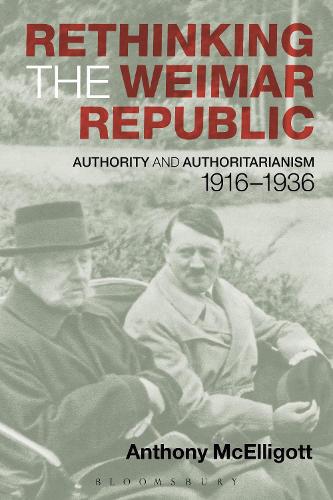
Rethinking the Weimar Republic: Authority and Authoritarianism, 1916-1936
(Paperback)
Available Formats
Publishing Details
Rethinking the Weimar Republic: Authority and Authoritarianism, 1916-1936
By (Author) Professor Anthony McElligott
Bloomsbury Publishing PLC
Bloomsbury Academic
19th December 2013
United Kingdom
Classifications
Tertiary Education
Non Fiction
943.085
Physical Properties
Paperback
384
Width 156mm, Height 234mm
540g
Description
McElligott's impressive mastery of an enormous body of research guides him on a distinctive path through the dense thickets of Weimar historiography to a provocative new interpretation of the nature of authority in Germany's first democracy. Sir Ian Kershaw, Emeritus Professor of Modern History at the University of Sheffield, UK This study challenges conventional approaches to the history of the Weimar Republic by stretching its chronological-political parameters from 1916 to 1936, arguing that neither 1918 nor 1933 constituted distinctive breaks in early 20th-century German history. This book: - Covers all of the key debates such as inheritance of the past, the nature of authority and culture - Rethinks topics of traditional concern such as the economy, Article 48, the Nazi vote and political violence - Discusses hitherto neglected areas, such as provincial life and politics, the role of law and Republican cultural politics
Reviews
[A] thought-provoking new approach to the Weimar Republic [This] well-researched book provides a perceptive analysis of Weimars struggle to maintain authority and of the Republics relationship to both the German Empire and the Third Reich. * The Historian *
This is an excellent and insightful book that challenges the reader to look anew at a familiar subject. McElligott demonstrates a masterful command of a huge range of material (there are over 100 pages of endnotes) and manages to combine an overview of the ebb and flow of the historiography on a variety of different aspects of life under the Weimar Republic with genuinely new insights drawn from the primary sources. * Reviews in History *
This is an impressive book and one that deserves to be taken seriously ... McElligott is to be commended for having written something substantially different from the conventional histories of Weimar. For, in doing so, he has provided a valuable new perspective on how and why Germanys first experiment in democracy ended in such bitter failure. * English Historical Review *
In a narrative that skilfully blends discourses, cultural and political practices, McElligott shows the difficulties inherent in the Republic's struggle for legitimacy ... A useful and stimulating synthesis * German History *
McElligotts comprehensive and challenging work will reward every reader who specializes in interwar European or twentieth-century German history, as well as those who do comparative work on authoritarianism. It includes some absolutely top-notch maps and a treasure trove of endnotes. * European History Quarterly *
More than 80 years after its demise, the Weimar Republic continues to fascinate. McElligott's own edited collection has enriched understanding of the republic's political instability and cultural dynamism. The chapter titled "Authority between Democracy and Dictatorship" is perhaps the volume's most compelling contribution, as McElligott discusses the Weimar constitution's inadequacies (or rather, the perception of such by contemporaries) and the widespread appeal during periods of acute crisis (1923, 1930-33) of dictatorship as a remedy for the failures of Germany's parliamentary democracy. A must read for any scholar interested in the origins of the Nazi dictatorship. Summing Up: Essential. Graduate students, faculty. -- K. C. O'Connor, Gonzaga University * CHOICE *
McElligotts persuasive analysis of the multifaceted nature of Weimars political culture is an important step toward a more open, contingent, and complex historical image of the Weimar Republic. * Central European History *
Anyone interested in the Weimar period will benefit from reading this impressively researched work. McElligotts 220 pages of text are supported by 110 pages of endnotes, with references to a wealth of archival and printed sources and an enormous body of secondary literature. -- Andrew G. Bonnell * Australian Journal of Politics and History *
All of the chapters are packed with provocative insights ... Undergraduates and specialists alike will profit from reading this book. * BHIL Bulletin *
McElligott's impressive mastery of an enormous body of research guides him on a distinctive path through the dense thickets of Weimar historiography to a provocative new interpretation of the nature of authority in Germany's first democracy. -- Sir Ian Kershaw, Emeritus Professor of Modern History at the University of Sheffield, UK
McElligott's study offers a significant and highly persuasive examination of the Weimar Republic's struggle for authority, a notion he embeds in both politics and culture. Offering strikingly new perspectives on the everyday struggles over authority at the national and local levels, McElligott challenges previous interpretations of Weimar's founding and of its collapse. This book is a must-read for scholars and students with an interest in Weimar and Nazi Germany. -- Kathleen Canning, Professor of History, University of Michigan, USA
A stimulating new analysis of Weimar politics, society and culture vivid, thoughtful, and thought-provoking. -- Elizabeth Harvey, Professor of History, University of Nottingham, UK
Author Bio
Anthony McElligott is Professor of History at the University of Limerick, Ireland.
